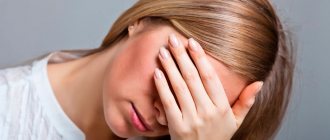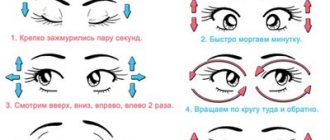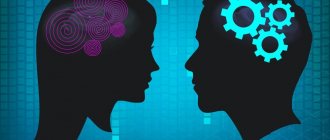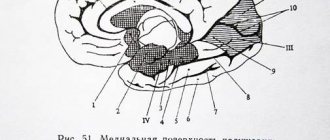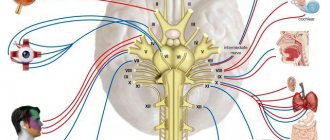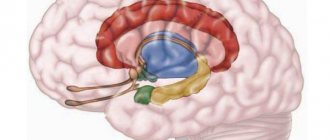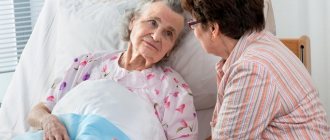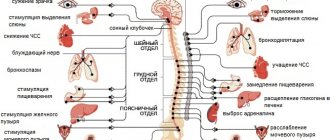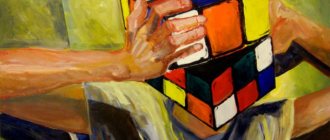Vegetative-vascular dystonia is characterized by impaired tone of blood vessels, spasms of blood vessels, impaired circulation, and impaired vision. Attacks during VSD are often accompanied by a decrease in visual acuity; attacks occur during which a person sees only darkness and cannot see the outlines of objects. Decreased vision and pain may occur on one side or affect both eyes.
At the Yusupov Hospital, research into VSD is carried out in several areas: the state of the cardiovascular system, visual system, digestive system, respiratory system, endocrine system, nervous system.
Why do my eyes hurt with VSD?
If a patient with VSD has floaters in front of his eyes, this is a common visual disorder caused by a sudden narrowing of the blood vessels in the eye. Flashes of light, distorted images, pain in the eyes, a cloudy or dark background with partial vision or a complete lack of vision of objects may also be bothersome. Examination of the patient's systems and organs helps to identify diseases associated with neuroses; the doctor prescribes treatment for depression, neurosis, and prescribes medications to relieve panic attacks, pain, and anxiety.
Pain in the eyes with VSD is often accompanied by headache and pain in the heart area. Often, along with pain in the eyes, vision drops sharply, the image becomes blurred, the vision becomes dark, flashes and spots appear before the eyes. Visual disturbances can indicate not only VSD; if such symptoms appear, you should consult an ophthalmologist, who, if there are no ophthalmological problems, will refer the patient to a neurologist or oncologist.
“Just like a vegetable.” Why do people continue to get sick a year after Covid?
MOSCOW, September 29 – RIA Novosti, Alfiya Enikeeva. According to various sources, from 20 to 75 percent of those who have recovered from COVID-19 still suffer from its consequences six months later. The main symptoms include chronic fatigue, shortness of breath, hair loss, panic attacks, and sleep problems. Doctors call this post-Covid syndrome. In Russia, every fifth patient is diagnosed with it. How these people live and deal with complications is in the material of RIA Novosti.
“I couldn’t do anything”
I got sick with Covid almost a year ago, on October 29th.
A nurse from the clinic came and took a test for coronavirus. It turned out to be negative, but ten days later my temperature rose, my nasopharynx became dry, and the vessels in my nose began to ache. My whole body ached—muscles, bones, joints. Otherwise, everything developed according to not the worst scenario: the temperature did not exceed 37.8 for only two days, and the saturation did not drop. A CT scan showed four percent lung damage. But there was a very strong tachycardia mixed with panic attacks. At rest, the pulse reached 120. And so it is until now. Plus, problems appeared with blood vessels in the legs and eyes. I even thought that I had a retinal tear due to oxygen starvation and vascular damage. But the ophthalmologist found nothing, thank God. He prescribed drops, but they didn’t help - my eyeballs seemed to hurt from the inside. I consulted with different doctors, no one could really say anything. Prescribed medications. Some only made things worse, while others had no effect at all. I decided to take one drug, an anticoagulant, on my own, the minimum dose. The doctors said that it was not needed: the coagulogram was normal, fibrinogen and d-dimer too. But at my own peril and risk I started drinking it, because my condition was like this: I just lay there like a vegetable and couldn’t do anything.
After the first pill I felt better - as if I had emerged from the water. The swelling decreased, the fog in the head went away, and - what is very important - the tachycardia disappeared, it just went away. I have been taking this drug for nine months. I tried several times to get off him, but in vain. If I don’t take the pill, the tachycardia returns. There was still total chronic fatigue. I get tired very quickly. In fact, I can only walk. I am unable to do any exercises. Cleaning the house is already a heavy physical activity. I almost stopped cleaning the floor; I use a robot vacuum cleaner.
Since I am an individual entrepreneur, I was able to organize a very light work schedule for myself. For the first three months, until January, I didn’t work at all. Business just stopped. No income - the airbag was eaten away.
“I had to quit my job”
Alexander Korchevny, 39 years old, Ekibastuz, Kazakhstan.
Now he is being treated at the Novosibirsk Center for the Prevention of Thrombosis. I fell ill at the beginning of June 2021, and was infected, presumably, at work. Took a PCR test - positive. I was sent into voluntary isolation in an infectious diseases hospital for 18 days. As it turned out, it was in vain: one after another, relatives fell ill with Covid.
In the hospital there was no special treatment, only observation, since the disease was not severe. There was a slight malaise for about three days, then for two days the temperature was difficult to bring down to 38. Smells disappeared, appetite decreased, and problems with sleep appeared. The first “call” was ten days after the diagnosis. An unexpected tachycardia began, a panic attack began and the pressure jumped. They gave me an injection of aminophylline. It seems to have gotten a little better.
He left the hospital neither sick nor healthy. I really wanted to go home after isolation. But things only got worse. New symptoms related to nerves and blood vessels were gradually added. Endless visits to doctors began. None of them fully understood what was wrong or how to treat me. All tests are more or less calm. Over the course of a year, I took courses with five neurologists in different cities. Everyone made two diagnoses: vegetative-vascular dystonia and chronic fatigue syndrome. Everyone hinted at a psychologist. I also visited him, he did not reveal any violations.
All this year the disease develops in waves: at times you feel well, at times you lie down and cannot get up. After courses of treatment there were minor improvements, but overall my health was far from normal. In the last 12 months I have taken more medications than I have ever taken in my entire life. I had to quit my job due to endless sick leave. I asked the local therapist what to do in such a situation, because I am disabled, but she just threw up her hands.
“My hair was coming out in clumps”
Nailya Vagizova, 38 years old, Kazan On June 1st I felt unwell.
I called the doctor. He said it was an acute respiratory infection, prescribed an antibiotic, an antiviral, vitamins, but it didn’t get any better. And already on the ninth I ended up in the hospital. There were problems with breathing. She spent five days in intensive care. Lung damage is more than 75 percent. Doctors told relatives that everything should be prepared for the worst. But I pulled myself together and began to get out. My husband brought drugs that the hospital did not have, and thanks to this I survived. She was discharged on June 19th and recovery began: exercises, proper nutrition, pills. In theory, they should be given to everyone for free, but they ran out on me, and my family bought everything. Three and a half months later, I still don't feel healthy. About two months after discharge, my hair began to fall out, just in clumps. Constant pain in my legs, aching joints in my arms. When I left the hospital, no one warned me that it could take so long and the recovery would be so difficult. There is no help from state medicine now. The doctors at the clinic don't say anything. I myself take all the tests for a fee, take vitamins, collect information on the Internet from people who have also been ill. I am a laboratory doctor by profession, so I began to independently understand the topic and control my condition.
“It’s easier for me to think that it’s not Covid”
Evgenia Yurfeld, Moscow I am not quite a standard post-Covid person.
I was given the third group of disability even before Covid, for the main disease. Atrial fibrillation provoked three strokes and bradycardia; a pacemaker had to be installed. So I started fighting dizziness, arrhythmia and disturbances in the functioning of the vestibular apparatus long before Covid. I got sick with coronavirus at the end of last fall, but in December I had a good test. The doctor immediately warned me about post-Covid. She herself suffered from COVID-19 and knows what it is. Now from time to time I experience some typical symptoms, but I consciously attribute them to the underlying disease. It's easier for me.
I am constantly under medical supervision. The doctor visits me regularly. They give me antiplatelet drugs for free, and I get a rather expensive anticoagulant at the pharmacy. Subspecialists come to your home to inspect it and take tests. But I rarely bother the clinic with requests. I learned to cope with attacks on my own. Overall, I just hope that sooner or later the body will adapt to someone else’s virus. If you have still survived with such a list of diseases and even suffered from Covid, then you have to thank your genes and your guardian angel.
“The main thing is to trust the doctors”
Valentina Nelyubova, 59 years old, Moscow I was diagnosed with Covid in January.
I was very sick. I almost went to another world. I was treated by private doctors at home for two weeks. Afterwards I was treated absolutely free of charge under the policy. And also very good. Plus, the family doctor constantly monitored me. She is also shocked: how did I survive with such bad tests and my condition is below par. When I was sick, I realized: the main thing is that there are good doctors nearby, and it doesn’t matter whether they pay or not. It is important how they are treated, and patients must trust doctors. Now, thank God, it's all over. I recovered from Covid for several months, it’s a long story. But everything ended well. I am very grateful to the doctors of the branch of the Alekseev Day Hospital at Polyclinic 121, in South Butovo. They really help cope with post-Covid syndrome and depression. Many people are afraid of mental hospitals. This is some kind of misinterpretation, misunderstanding. But only qualified psychologists can get to post-Covid problems and help. At least they helped me.
“This is already an independent disease”
According to researchers from Sechenov University, in Russia more than 20 percent of patients who have suffered coronavirus infection suffer from post-Covid syndrome.
Among the most common complaints are weakness (more precisely, fatigue), shortness of breath, anxiety, depression, sleep problems and hair loss. “Post-Covid syndrome (PCS) is a symptom complex that occurs as a result of a coronavirus infection. This is a very broad concept, which may include damage to the nervous, cardiovascular systems, gastrointestinal tract, and muscle atrophy. There may even be some mental manifestations. Its duration is a purely individual matter. For some, the main symptoms are resolved in a mild form within two to three months. For others, they last up to a year or even more. It’s too early to talk about maximum terms. We are just observing this disease and studying it. In my experience, patients last the longest with various neurological disorders, lesions of the peripheral nervous system,” Professor Evgeniy Achkasov, head of the department of sports medicine and medical rehabilitation at Sechenov University, expert of the National Health League, told RIA Novosti.
According to him, PCS symptoms, their severity and duration often depend on the severity of COVID-19, but not always. Thus, among the patients there are many people who suffered from Covid itself relatively easily, but have been suffering from its complications for more than a year.
“The basis of rehabilitation programs for post-Covid syndrome is breathing exercises, cyclic physical exercises, and cardioprotection. We strive to protect the heart muscle both with medication and with various physical therapy options. We use massages and pressure chambers. Quite a wide range. But we must understand that it is often very difficult to rehabilitate such patients at home. It's better to be hospitalized. Post-Covid syndrome is already an independent disease, and it must be taken very seriously,”
- the professor emphasized.
However, if the symptoms of ACL are pronounced, and there is no opportunity to see a doctor, then experts advise doing Nordic walking. This type of physical activity has a good effect on the cardiovascular and respiratory systems. But in no case should you inflate balloons to restore lung volume, so as not to cause additional pulmonary injury.
Link to publication: ria.ru
Visual impairment due to VSD
There are several causes of visual impairment in VSD:
- disturbance of blood circulation in the blood vessels of the head. The small vessels of the eye become thinner, the blood circulation of the eye is disrupted, the image is distorted, and visual acuity decreases. Lack of blood circulation in the vessels of the brain and eyes causes image distortion;
- panic attacks, increased anxiety are accompanied by a feeling of constant fear, have a negative impact on thinking, mood, functioning of the nervous system and all organs and systems. This leads to disruption of the visual system;
- a person living in stress perceives the world in “black colors”, he loses interest in life, stops recording joyful and interesting events - this manifests itself in the form of detachment from everyone, the eyes turn red, hurt, the body is exhausted by stress, immunity drops, the patient sees the surrounding reality in dim, unclear images. Stress leads to loss of vision, exacerbation of chronic diseases;
- stress or neurosis often leads to loss of appetite, the patient is indifferent to the quality of his diet, and the daily diet lacks nutrients and vitamins. An unbalanced diet causes a lack of nutrients in the brain, brain tissue and blood vessels begin to suffer, the functioning of brain structures is disrupted, vision decreases, and memory deteriorates.
Clinical manifestations of the visual system in vegetative-vascular dystonia:
- flickering spots in the eyes are observed when overtired, changing position;
- a flash of light that may be accompanied by loss of balance;
- pain in the eyes occurs in bright light, when touched, blinking, the pain can become constant, aching, one-sided or two-sided;
- there is double vision, the image is distorted, the clarity of the image disappears;
- when looking at an object, the surrounding background loses clarity and becomes cloudy;
- it becomes dark in the eyes, for a certain time the patient sees only a dark background without the outlines of objects.
What is vegetative-vascular dystonia from the point of view of neurophysiology
Vegetative-vascular dystonia is not an independent disease, but a complex symptomatic complex that is a consequence of improper functioning of the autonomic nervous system. This disorder occurs to one degree or another in 80% of the world's inhabitants and is associated with changes in the activity of the nervous system. For the first time it can make itself felt in childhood or adolescence, during the active growth and formation of the body. More pronounced disorders appear between 20 and 40 years of age. Moreover, they occur 3 times more often in women than in men. In combination with other pathological factors, VSD provokes the development of many psychosomatic diseases, which, in turn, aggravate autonomic disorders.
How to eliminate vision problems with VSD
Problems with visual impairment and eye pain can occur with high intracranial pressure, high blood pressure, stress, and physical inactivity. When visiting an ophthalmologist at the Yusupov Hospital, the patient will undergo the necessary tests of intraocular pressure, blood pressure, and an examination of the condition of the visual organs. With VSD, the nervous regulation of all structures of the body changes, including those responsible for the position and movement of eye structures. Hypotonicity and hypertonicity of the muscles responsible for the condition of the lens of the eye, smooth muscle muscles of blood vessels leads to a change in the refractive function of the eye lens, affects the photoreceptors of the retina, and discoordination of the smooth muscles of the iris occurs. Spasm of the muscles of the walls of the small blood vessels of the eye leads to disruption of the nutrition of the cells of the eye structure, causing visual impairment.
The doctor will determine what diseases cause vision deterioration and what causes the pain in the eyes. During the examination, the main symptoms will be determined: different pupil sizes, changes in the fundus, swelling and bruising around the eyes, red eye syndrome, blurred vision. If a patient has VSD, prevention is of great importance. To avoid a decrease in visual acuity, you should maintain a healthy lifestyle, eat a balanced diet and avoid stressful situations. In the rehabilitation department of the hospital, dystonics will be able to take courses in physical therapy and breathing exercises. Dystonics will be able to undergo treatment of diseases against which VSD is diagnosed in a neurology clinic. You can make an appointment with a doctor by calling the Yusupov Hospital.
How you can help
There is no need to panic. The patient must understand that visual impairment may be temporary.
Laboratory tests will help determine the root cause of the disorder. The doctor also examines the fundus of the eye and conducts a survey of the patient. Based on the information received, a conclusion is drawn.
Pressure correction
Treatment must be comprehensive. Breathing exercises can help. It is advisable to perform exercises according to A. Strelnikova’s method.
The duration of the lesson varies from 7 to 20 minutes. After exercise, there is a decrease in anxiety. This has a beneficial effect on blood pressure.
The holding of trainings
They are prescribed to normalize the energy of thoughts. Trainings help to free yourself from physical and emotional fatigue and neutralize negativity. A person can find a way out of a stressful situation.
Using psychoregulation techniques, a specialist can teach a patient to cope with a bad mood. After this, the body will be able to understand that it is completely healthy.
Carrying out reflexology
If bruises under the eyes occur against the background of VSD, the patient is recommended to undergo:
- Manual therapy.
- Acupuncture.
- Massage course.
The specialist influences the necessary reflex points. The result of this is the normalization of the nervous system. The tension is relieved, the pressure is normalized.
Correction of daily routine
If a person suffering from VSD is bothered by red eyes, correcting his daily routine can help. The patient is recommended:
- do aerobics;
- dance;
- swim;
- go for a run;
- ride a bike.
Red eyes often appear in those who work a lot at the computer. It is recommended to interrupt the lesson and perform eye exercises. After completing all your work, you need to walk for 40-60 minutes. After this, your eyes will never turn red.
Nutrition correction
Some patients develop bruises under the eyes due to poor nutrition. This is especially true for coffee and alcohol lovers. The diet of a person with VSD should be balanced.
The menu should include foods rich in vitamins and minerals. Nutrients must enter the bloodstream. It is advisable to drink green tea, fresh juices, compotes and fruit drinks.
Drug therapy
The patient is prescribed the use of neurotropic or psychotropic drugs. The dosage is determined by the doctor; self-administration of medications is prohibited. If the drug does not help, the doctor replaces it with another medicine.
Causes of vegetative-vascular dystonia
The causes of VSD are quite varied. The list includes various internal and external factors.
Internal include:
- heredity (most often such disorders are transmitted through the maternal line);
- congenital vascular disorders, damage to the hypothalamus, cerebrospinal fluid circulation disorders;
- physiological hormonal changes.
Among the external reasons that can provoke the development of VSD are:
- allergies;
- depression, prolonged stress, psycho-emotional stress;
- emotional instability;
- excessive mental and physical stress;
- inability to verbally express emotions (alexithymia);
- sedentary lifestyle;
- negative impact of climatic and meteorological conditions;
- unbalanced diet;
- cervical spine injuries;
- traumatic brain injuries;
- previous neurological, endocrine or somatic diseases.
In addition to the above reasons, there are other factors under the influence of which the symptoms of vegetative-vascular dystonia worsen:
- (PMS) premenstrual syndrome;
- alcohol abuse;
- nicotine addiction.
Treatment of vegetative-vascular dystonia
It should be noted that the treatment of VSD is a complex process that includes drug therapy. Today, one of the most effective domestic drugs that can act directly on the cause of vegetative-vascular disorder is Eltacin®.
This product belongs to the group of antioxidants and antihypoxants and contains carefully selected dosages of active substances that help normalize redox reactions, increase the body’s adaptive capabilities and normalize the state of the autonomic nervous system.
